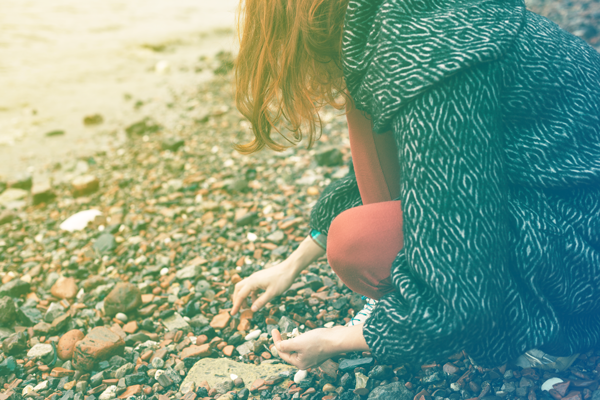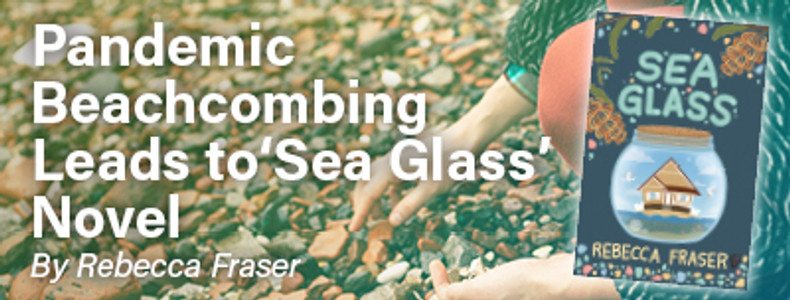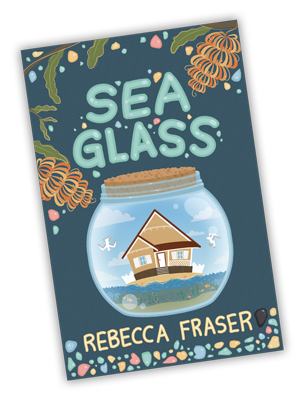At the height of the pandemic, Melbourne, the capital of Victoria in Australia’s south-east, earned the unenviable title of the ‘world’s most locked down city’, clocking up 260 days over six lockdowns under some of the country’s toughest COVID-19 restrictions. Curfews were introduced, along with a travel bubble restricted to a five kilometer radius for the permitted one hour of daily exercise.
Thankfully, my five kilometers included the beach. Beachcombing, a pastime I’d always enjoyed for its meandering freedom, became my physical and emotional salvation. It also sparked the idea for a middle grade novel Sea Glass which would go on to be signed by Australian publishing legends, Wombat Books.

I live on the Mornington Peninsula, a 192-kilometer stretch of shoreline south of Melbourne that shares stunning natural assets with a coastal community that swells during holiday season. With sheltered Port Phillip Bay on one side, and wilder Westernport Bay on the other, the Mornington Peninsula is a treasure trove for beachcombers.
Our shipping channels host everything from fishing trawlers to naval vessels, cargo ships, the Coast Guard, luxury yachts, cruise ships, ferries—every type of recreational and commercial vessel—so you never know what you might find. I’ve seen everything washed ashore from nautilus shells to crates of coconuts from Indonesia; beautifully aged beach pottery to a Green Sea Turtle who had lost his way and was miles from home, and of course, sea glass. Browns, greens, whites, and a smattering of sea foam are the usual color suspects here, but I have found a small piece of red in the past, and also a fine example of pirate glass.
My collection grew extensively during lockdown. News of storms and swells became of heightened interest, as I wondered what gems might have been washed ashore. Rain or shine, even in the depths of winter, I’d eagerly walk the two hundred stairs down to my local Birdrock Beach, eyes fixed to the sand.
As a writer, my creativity had spluttered like a dying flame with each passing month of lockdown. My daily beach walks revived me. Characters began to leave their footprints in the sand beside me—a city-dwelling girl, and her estranged grandfather who lived a hermit-like existence on a remote coastline. Their characters and plotlines grew with each ebb and flow of the tide, and when their voices grew from a whisper to a roar in my head, I knew it was time to commit their story to paper.
As a long-term sea glass enthusiast, I’ve always been fascinated by the science behind how sea glass is formed, and how the history of each piece tells its own remarkable story. I also understand the close relationship many grandparents have with their grandchildren...and I got to wondering “what if” when it came to a family torn apart by the weight of grief.
Award-winning publishers, Wombat Books picked up Sea Glass, and it was released in March 2023. Sea Glass has gone on to enjoy some wonderful industry and peer reviews, as well as being included in the Queensland Premier’s Reading Challenge, longlisted for Adaptable: Turning the Page to Screen, an initiative of Queensland Writers Centre’, and shortlisted for the 2023 Readings Children’s Prize .
At its heart, Sea Glass is an emotionally-rewarding story that explores how, despite difference and disaster, a generational gap can be bridged by a shared enthusiasm for sea glass. It also proves you’re never too old to go treasure hunting! As a lover of the ocean, an avid beachcomber, and sea glass enthusiast and collector, Sea Glass was a pleasure to write—it combines three of my greatest passions.
With the pandemic now declared over in Australia, I’m back to writing regularly, and exploring the amazing shorelines Australia boasts…this time with no restrictions on distance or creativity.


